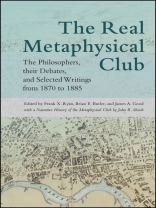A full account of the Metaphysical Club, featuring the members’ philosophical writings and four critical essays.
The Metaphysical Club, a gathering of intellectuals in the 1870s, is widely recognized as the crucible where pragmatism, America’s distinctively original philosophy, was refined and proclaimed. Louis Menand’s bestseller about the group was a dramatic publishing success. However, only three actual members-Oliver Wendell Holmes Jr., Charles S. Peirce, and William James-appear in the book, alongside other thinkers who were never in the Club. The Real Metaphysical Club tells the full story of how this influential group shifted the course of philosophy in America. In addition to pioneering pragmatism, the group explored radical empiricism and idealism, and formulated personalism and process philosophy, equally important developments. This volume contains the important writings dating from 1870 to 1885 by the real members of the Metaphysical Club. The first section centers on pragmatism and science; the second part collects writings of the lawyers; and the third part covers idealist and personalist philosophers. Many of these writings have never been reprinted before, and nothing like this impressive collection has ever been attempted. A general introduction provides a narrative history, and the editors’ three introductions to the volume’s sections vividly bring to life the intense meetings, sustained debates, and pioneering thought of the Metaphysical Club.
Зміст
A Note on the Texts
A Narrative History of the Metaphysical Club
John R. Shook
Part I: Science and Pragmatism
Science and Pragmatism: An Introduction
Frank X. Ryan
Chauncey Wright
Charles Peirce’s Berkeley Review. The Nation 13 (30 November 1871): 355–56
Evolution by Natural Selection. Review of Darwin and Mivart. North American Review 115 (July 1872): 1–31
Cause and Effect. Dated 1874
The Evolution of Self- Consciousness. North American Review 116 (April 1873): 245–310
Notes on Nihilism. Dated 1874
Charles Sanders Peirce
Fraser’s The Works of George Berkeley. North American Review 113 (October 1871): 449–72
Mr. Peirce and the Realists. The Nation 13 (14 December 1871): 386
The Fixation of Belief. Popular Science Monthly 12 (November 1877): 1–15
How to Make Our Ideas Clear. Popular Science Monthly 12 (January 1878): 286–302
William James
Taine’s On Intelligence. The Nation 15.374 (29 August 1872): 139–41
Against Nihilism. Dated to 1873 or 1874
Maudsley’s Responsibility in Mental Disease. Atlantic Monthly 34.203 (September 1874): 364–65
Tait and Stewart’s The Unseen Universe. The Nation 20.517 (27 May 1875): 366–67
Wundt’s Grundzüge der physiologischen Psychologie. North American Review 121 (July 1875): 195–201
Lewes’s Problems of Life and Mind. Atlantic Monthly 36 (September 1875): 361–63
Chauncey Wright. The Nation 21 (23 September 1875): 194
Remarks on Spencer’s Definition of Mind as Correspondence. Journal of Speculative Philosophy 12.1 (January 1878): 1–18
The Sentiment of Rationality. Mind o.s. 4 (July 1879): 317–46
G. Stanley Hall
Philosophy in the United States. Mind o.s. 4.3 (January 1879): 89–105
Part II: Law and Pragmatism
Law and Pragmatism: An Introduction
Brian Butler
Nicholas St. John Green
Proximate and Remote Cause. American Law Review 4.2 (January 1870): 201, 203–204, 210–16
Insanity in Criminal Law. American Law Review 5.4 (July 1871): 704–709
The Power of the Will over Conduct. Criminal Law Reports, Volume 1 (New York: Hurd and Houghton, 1874), 390
The Maxim that a Man is Presumed to Intend the Natural Consequences of His Acts. Criminal Law Reports, Volume 2 (New York: Hurd and Houghton, 1875), 244–46
Reasonable Doubt. Criminal Law Reports, Volume 2 (New York: Hurd and Houghton, 1875), 437
Oliver Wendell Holmes Jr.
Codes, and the Arrangement of Law. American Law Review 5 (October 1870): 1–13
Notice of Pollock on Austin’s Definition of Law. American Law Review 6 (July 1872): 723–25
Primitive Notions in Modern Law. American Law Review 10 (April 1876): 422–39
The Common Law (Boston: Little, Brown, 1881), chap. 1, 1–5, 34–38
Joseph Bangs Warner
Holmes’s Common Law. American Law Review 2 (May 1881): 331–38
Part III: Varieties of Idealism
Varieties Of Idealism: An Introduction
James A. Good
John Fiske
Cosmic Theism. Outlines of Cosmic Philosophy (Boston: Houghton Mifflin, 1874), vol. 2, 411–31
Charles Carroll Everett
The Known and the Unknowable in Religion. The Unitarian Review and Religious Magazine 3 (May 1875): 445–56
James Elliot Cabot
Some Considerations on the Notion of Space. The Journal of Speculative Philosophy 12 (July 1878): 225–36
Thomas Davidson
Individuality. Dated to 1878 (from 22 October 1878). In Sketches and Reminiscences of the Radical Club of Chestnut Street, ed. Mary Elizabeth Fiske Sargent (Boston: J. R. Osgood, 1880), 334–38
Borden Parker Bowne
The Cosmic Philosophy. Review of Outlines of Cosmic Philosophy, by John Fiske. Methodist Quarterly Review 58 (October 1876): 655–78
Realism, Idealism, and Phenomenalism. Metaphysics: A Study in First Principles (New York: Harper and Brothers, 1882), 450–87
Francis Ellingwood Abbot
The God of Science. Scientific Theism (Boston: Little, Brown, 1885), 202–18
George Holmes Howison
Is Modern Science Pantheistic? Journal of Speculative Philosophy 19 (October 1885): 363–84
Index of Names
Index of Subjects
Про автора
Frank X. Ryan is Associate Professor of Philosophy at Kent State University and the author of Seeing Together: Mind, Matter, and the Experimental Outlook of John Dewey and Arthur F. Bentley. Brian E. Butler is Professor of Philosophy at the University of North Carolina Asheville and the author of The Democratic Constitution: Experimentalism and Interpretation. James A. Good is Dean of the Social and Behavioral Sciences, Business, and Economics Division at Lone Star College-North Harris. He is the coeditor (with John R. Shook) of John Dewey’s Philosophy of Spirit, with the 1897 Lecture on Hegel.












